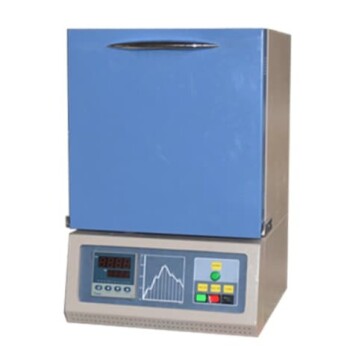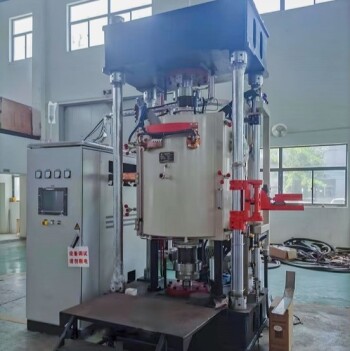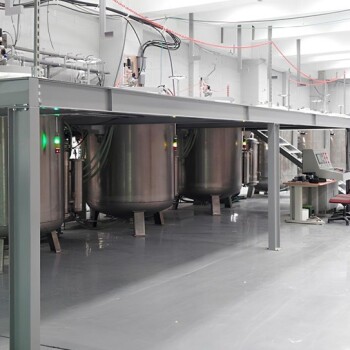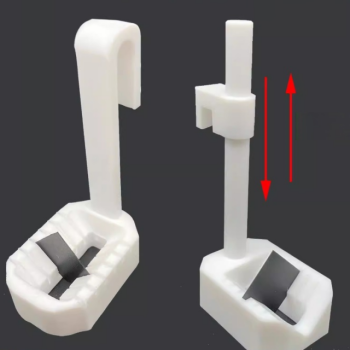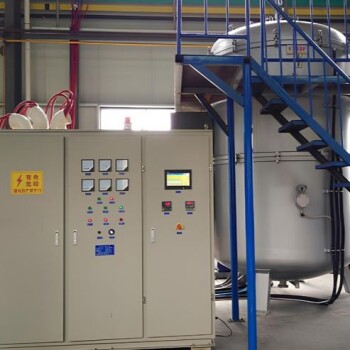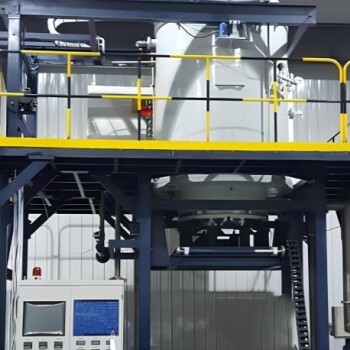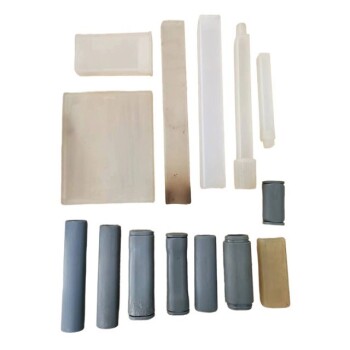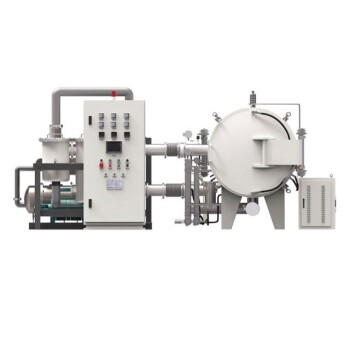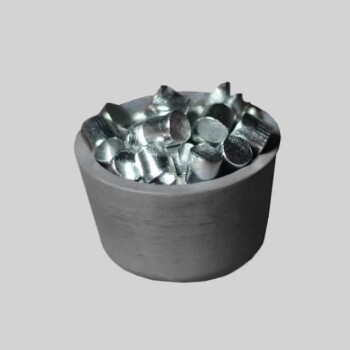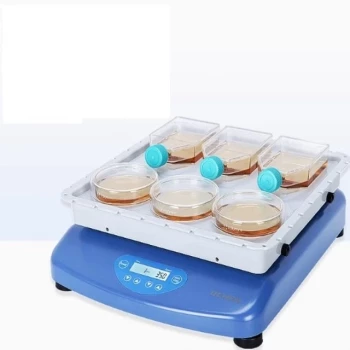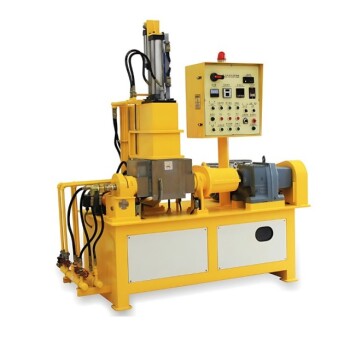At its core, a laboratory oven offers three primary advantages: precise temperature uniformity, the ability to gently dry materials without damage, and a safe, controlled environment for processing. It achieves this by using convection heating to circulate hot air, ensuring that every part of a sample is treated at the same temperature, while integrated vents safely remove moisture and fumes.
The fundamental advantage of a laboratory oven is not simply its ability to generate heat, but its power to deliver controlled, uniform, and safe thermal processing, which is essential for repeatable and reliable scientific results.
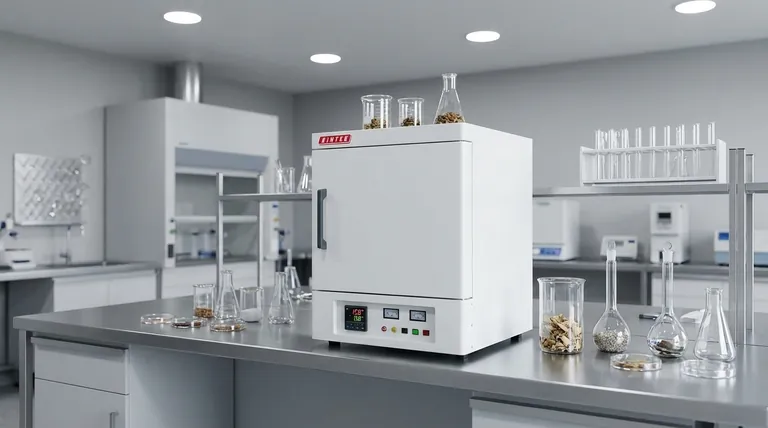
The Core Principle: Precise and Uniform Heating
The primary function that sets a laboratory oven apart from a standard oven or hot plate is its method of heat delivery. It relies on convection to create an exceptionally stable thermal environment.
Eliminating Hot Spots with Convection
A laboratory oven uses a fan to actively circulate heated air throughout the chamber. This process, known as convection, ensures that the temperature is consistent in every corner of the oven.
This uniformity is critical for scientific applications. It guarantees that an entire batch of samples or a single large sample is heated evenly, preventing one part from being under-processed while another is over-processed.
Gentle Dehydration Without Damage
The oven heats samples using hot air rather than direct radiant heat (like the glowing elements in a toaster). This gentle approach is ideal for drying sensitive materials or evaporating solvents.
By avoiding direct radiation, the oven prevents the surface of a sample from being scorched or chemically altered, preserving the integrity of the material being tested or prepared.
Ensuring Safety and Purity
Beyond just heating, a laboratory oven is engineered to manage the byproducts of thermal processes, ensuring both the safety of the user and the purity of the sample.
Controlled Removal of Fumes and Moisture
As samples are heated, they often release moisture, fumes, or volatile organic compounds (VOCs). Laboratory ovens are equipped with adjustable vents to safely channel these substances out of the chamber.
This prevents a buildup of humidity that could interfere with drying processes and removes potentially hazardous fumes from the laboratory atmosphere.
Sterilization Capabilities
With operating temperatures that can reach 250°C (482°F) or higher, laboratory ovens are perfectly suited for dry-heat sterilization.
This allows for the effective sterilization of heat-stable items like glassware and metal instruments, which is a routine and critical requirement in biological and chemical labs.
Understanding the Trade-offs
While highly effective, a laboratory oven is a specialized tool. Understanding its limitations is key to using it correctly.
Not a Furnace
Laboratory ovens are designed for applications like drying, curing, and sterilizing, typically below 300°C. They are distinct from muffle furnaces, which operate at much higher temperatures (often over 1000°C) for processes like ashing, heat-treating metals, or melting glass.
Slower Than Direct Heating
Because it relies on heating a volume of air to achieve uniformity, a convection oven can take longer to heat a sample compared to direct methods like a hot plate or microwave. The trade-off is speed for precision and evenness.
Making the Right Choice for Your Application
Selecting the correct heating instrument depends entirely on your specific goal.
- If your primary focus is drying sensitive samples: A laboratory oven's gentle convection is ideal for achieving uniform dryness without damaging the material.
- If your primary focus is sterilizing glassware or instruments: A lab oven provides the necessary dry heat and stable temperature control required for effective sterilization.
- If your primary focus is high-temperature analysis (like ashing): You require a muffle furnace, not a laboratory oven.
Choosing the right tool is the first step toward achieving reliable and repeatable outcomes in the lab.
Summary Table:
| Advantage | Key Feature | Primary Application |
|---|---|---|
| Precise Uniform Heating | Convection air circulation | Even drying and curing of samples |
| Gentle Drying | Hot air, not radiant heat | Dehydrating sensitive materials without damage |
| Safe Fume & Moisture Removal | Adjustable vents | Processing samples with VOCs or humidity |
| Sterilization Capability | Temperatures up to 250°C+ | Dry-heat sterilization of glassware and instruments |
Ready to enhance your lab's thermal processing with precision and safety? KINTEK specializes in high-performance laboratory ovens and equipment designed for reliable drying, curing, and sterilization. Whether you're processing sensitive samples or sterilizing glassware, our solutions deliver the uniform heating and safety features your lab demands. Contact us today to find the perfect oven for your application and achieve consistent, repeatable results!
Visual Guide
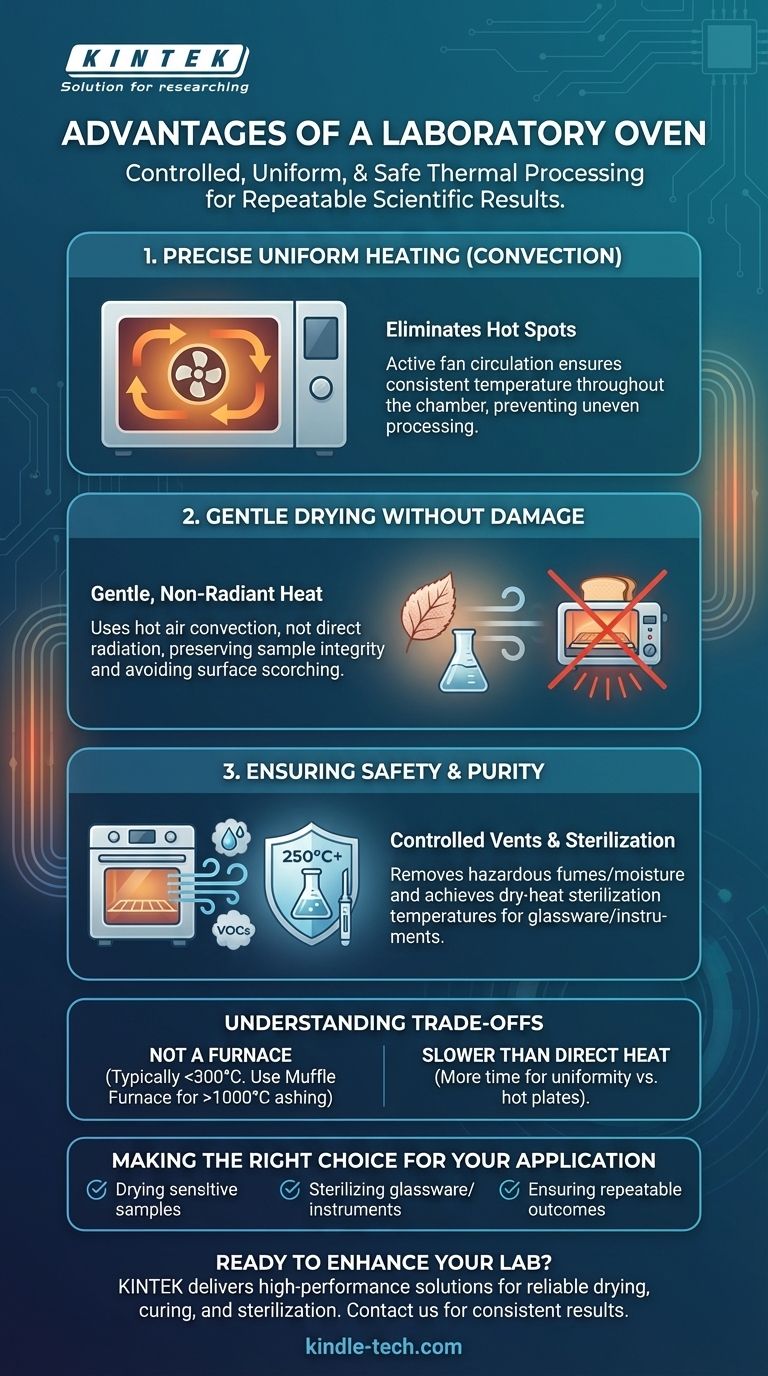
Related Products
- 1200℃ Muffle Furnace Oven for Laboratory
- Three-dimensional electromagnetic sieving instrument
- Vacuum Heat Treat and Pressure Sintering Furnace for High Temperature Applications
- Graphite Vacuum Furnace Negative Material Graphitization Furnace
- Custom PTFE Wafer Holders for Lab and Semiconductor Processing
People Also Ask
- What are the primary applications for muffle/tube furnaces in coaxial nanopillar solar cell manufacturing?
- Why is a muffle furnace essential for determining the ash content of Napier grass? Ensure Accurate Biomass Analysis
- What are the conditions for a muffle furnace? Ensure Safety, Performance, and Longevity
- What are the precautions of muffle furnace? Essential Safety Protocols for Your Lab
- Why is the annealing treatment in a high-temperature muffle furnace critical for the preparation of an Sb-SnO2 interlayer?
- What is a laboratory oven? A Guide to Precision Heating for Scientific Applications
- How do you run a muffle furnace? Master the Step-by-Step Process for Safe, Precise Results
- What is the function of a high-temperature furnace in SPWHT? Replicating Stress-Relief for 2.25Cr1Mo0.25V Steel
